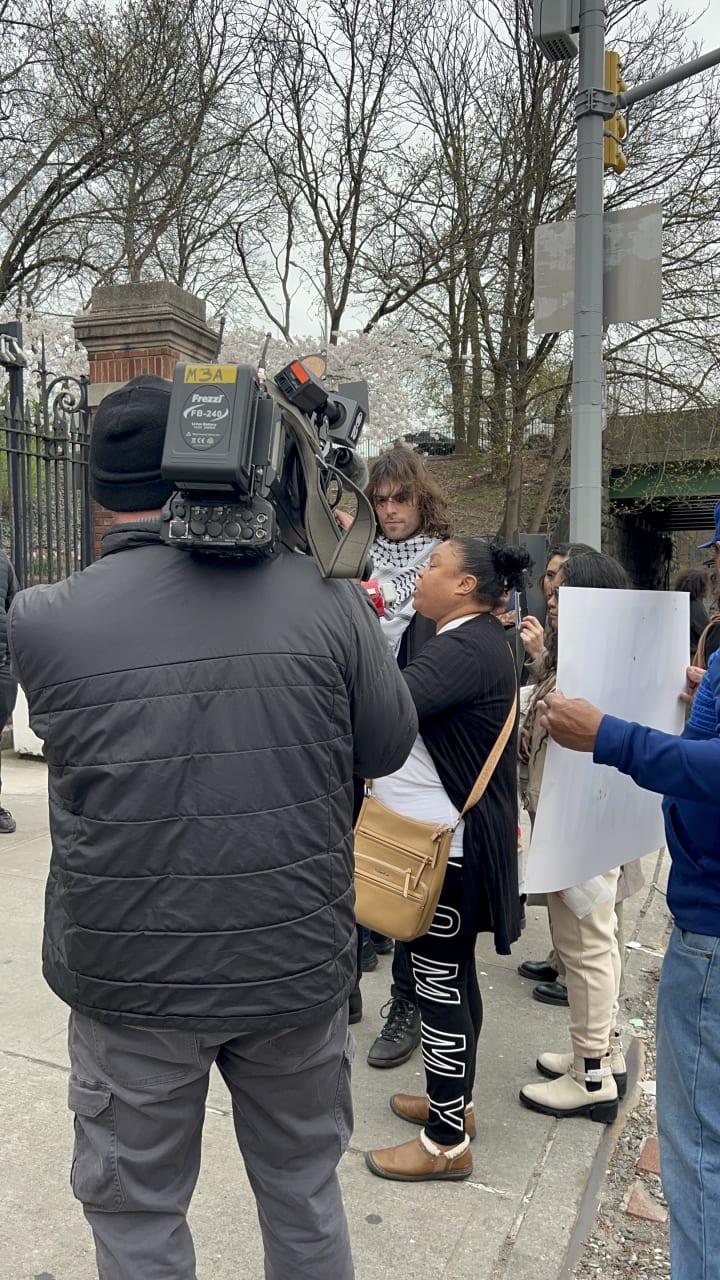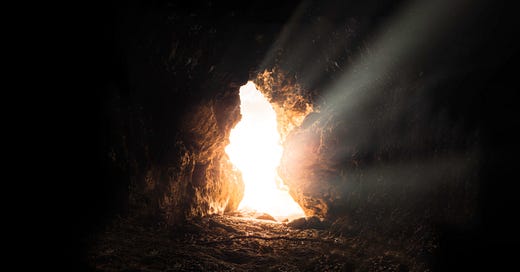Easter, Eric Adams, and revolutionary theology in New York City.
The mayor attempts to erase the Black and brown religiosity of our city.

Eric Adams described himself as a believer in revolutionary theology last month.
At a mental health summit hosted by his Office of Faith Based and Community Partnership (OFCP), Adams spoke for 10 minutes about the role his faith journey plays in how he views gun violence, China and TikTok, depression in young girls, weed, and suicide. He discussed the loss of religion and spirituality in the city and country as a “dysfunction” and called on religious leaders to minister more intentionally to young women and men.
The summit, which was done in collaboration with the International Interfaith Research Lab at Teachers College, Columbia University, focused on self-care, empowering care, and congruent care. Speakers included Fernando Cabrera, Amra Sabic-El-Rayess, Ashwin Vasan, Ayana Jordan, and Reverend A.R. Bernard.
There was no explicit mention of capitalism or inflation or how our tax dollars are used to fund systems and institutions that negatively impact our bodies and minds. There was no discussion of Adams’ budget and what it does or does not allocate for mental health services in the city.
Adams believes that city-wide and national lack of faith and spirituality are to blame for the emergencies we see around us and included a call to action to leaders and New Yorkers to make the five boroughs spaces of healing, faith, and understanding—a city where asylum seekers or tourists notice God and spirituality first.
Adams made no mention of research or reporting on changing religious attitudes, especially those of millennials and younger Americans, who no longer feel called to associate with or identify with the labels of institutional religion. Many now identify as “nones.” You can read Carol Kuruvilla’s “The Most Common Religious Identity For Young Americans Is ‘None,’ Study Suggests” or Kaya Oakes’ The Nones are Alright: A New Generation of Believers, Seekers, and Those in Between.
Yet he lamented the separation of church and state and mentioned the need for mental health work centered around wellness and spirituality, especially for young people. There was no mention of his budget or police violence or how the city fails to feed, clothe, and house its people. No mention of our crumbling hospital systems. No mention of the ways our spirituality suffers when the state does not meet our material needs.
Towards the end of his speech, Adams cited his mother as setting his religious foundation, describing how he and his siblings were always surrounded by scripture and religious paraphernalia and worship music. He wants the city to be a place that is more outwardly spiritual, a city that feels and looks undisputedly committed to a belief in something more, something divine, liberatory, revolutionary.
“Is this a city where God lives? Where spirituality lives? Because I know that if Matthew, Mark, Luke, and John—or any spiritual beings that you might believe in—if they were here today, they’d be in the homeless shelters. They’d be with the asylum seekers. They’d be with young people who are carrying guns,” he said. “They would be on the ground because that is the revolutionary theology that I believe in and I think we need to live by.”
Adams has made several public statements on religion this year.
During an interfaith breakfast in February, he rejected the separation of church and state, saying, “When I put policies in place, I put them in with a God-like approach to them. That’s who I am.” Three days after the OFCP summit, he appeared on MSNBC and said that in the United States “we are boiling ourselves to death” because of “our failure to embrace our spirituality.”
He made sure to erase the feeding and aid and housing and clothes and spiritual direction and organizing Black and Brown religious New Yorkers always provide—a shift in the language the mayor used last year when the OFCP opened in February 2022. Last year he stated: “Our faith community has gone above and beyond the past two years, working tirelessly to keep our people fed, safe, and healthy, mentally and physically…It’s past time that the city recognized the critical role they play in uplifting people across our city.”
A shift in tone and rhetoric is not new for New York City’s politicians, and my comrade Siddika challenges me to think about who above Adams might have a say in the mayor’s policies and public statements. I am sitting with their challenge and trying to understand who or what controls an already powerful mayoral office.
What revolutionary theology does Adams truly believe in? Why does he choose to use the language of liberation and resistance, especially around faith-based mental health work in the city, while his $102.7 billion budget is reviewed?
I also want to highlight Adams’ attempts at erasing the Black and brown religiosity of our city. Events like the summit, hosted by an official city hall organization, are used as public records. It is important to have other accounts and timelines of how his religious language changes throughout his time in office.
I am also thinking through the following:
What “revolutionary theology” does Adams truly believe in?
Why does he keep discussing the separation of church and state? How does this compare to the weaponization of faith we have seen from Republicans and Democrats in recent years, especially during the last presidential election?
Why does he choose to use the language of liberation and resistance, especially around faith-based mental health work in the city, while his $102.7 billion budget is reviewed?
Why does he publicly promote a faith rooted in centering our most marginalized while actively empowering the NYPD, which continues overspending our tax dollars and shooting our communities? While landlords continue to evict us? While we go hungry and unclothed?
***
It is Easter Sunday as I finish this essay.
Resurrection Sunday.
A Palestinian man rises after he is lynched by the state.
I am always thinking about revolution and resistance, what it means to respond to a city/state/empire that kills and exploits us. I am always thinking about the role of religion and theology and spirituality in community work.
Earlier this week, Palestinian worshippers were assaulted by Israeli police in Jerusalem. During Ramadan, our Muslim community is surveilled and infiltrated by police in New York City.
A Dominican man described as faithful was shot six times by two officers last month. Dominican elder women, spiritual and immigrant, physically protest this brutality. Muslim community organizers are fighting against racism in our hospitals and slumlords and hosting clothing drives and community dinners. Bronx churches and mosques have weekly food drives. Spiritual Black birth workers support our mothers, infants, and families.
The city is deeply religious, deeply spiritual. It is born from and sustained by an unwavering commitment to loving the most marginalized and oppressed. An unwavering belief in, as Shadaab Rahemtulla writes in Qur’an of the Oppressed: Liberation Theology and Gender Justice in Islam, the idea that “liberating ideas can only be truly liberating if they are translated into concrete realities.” (I learned of this book thanks to Asad Dandia’s “The Islamic Liberation Reading List.”


During last week’s rally outside the 52nd precinct, held on Good Friday, a Dominican elder proclaimed that there must be better methods for addressing the mental health needs of New York City citizens, especially those in non-English speaking communities. Raul de la Cruz had a schizophrenic episode and was shot six times by police officers. The elder and other community members want better healthcare resources and support for immigrants with schizophrenia and other disorders; non-lethal de-escalation in response to physical, sometimes harmful, episodes.
This is the revolutionary theology to emulate. Not the theology or faith or spirituality of a mayor that must be convinced to care for God’s people.
We are made to and for love, the Dominican elder shouted at the rally. They reject the city’s violence because they reject any and all pain inflicted on the human body. This is liberation. Resistance.





